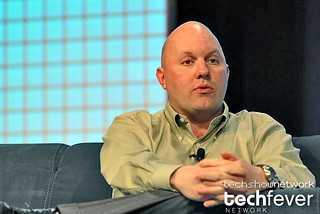Newspaper Death Watch |
| Rosy Forecasts about the Future of News Posted: 12 Mar 2014 09:18 AM PDT  Marc Andreessen, internet pioneer and founder of Netscape at Web 2.0 Expo in San Francisco, CA (Photo credit: TechShowNetwork) Pretty much anything Marc Andreessen writes is worth reading, and his latest treatise on the future of the news business should be required reading for any publishing executive. The man who arguably started all the trouble with the invention of the Mosaic browser in 1993 isn’t just an optimist on the future of the news business; he’s positively bullish about it. But the future he sees is much more like the newspaper market of the turn of the 20th century than the one that dominated the last 30 years of the 21st. His 3,000-word prescription boils down to a few basic points, not all of which are new: Run the news business like a business. Take advantage of the many new revenue sources that are emerging, in particular native advertising and subscriptions. Take advantage of media democratization. Sure, anybody can be a publisher today, but that’s an opportunity as well as a problem. Universal media access creates noise, which presents opportunities for aggregators to simplify the cacophony. It also creates the possibility of much larger audiences than we have known the past. "The big opportunity for the news industry in the next five to 10 years is to increase its market size 100x AND drop prices 10X," Andreessen writes. In other words, throw out the business model that relied upon scarcity and replace it with one that values abundance. Stop playing defense. The good old days of news monopolies and oligopolies are gone forever, so get over it and focus on the future. The few organizations that have successfully crossed the chasm – he mentions The Guardian and The New York Times – began thinking digital-first years ago. What are the rest of you waiting for? Find new revenue models. Bitcoin is going to make micro-payments feasible, so study up and start experimenting. And tear down that Chinese wall. It defeats too many new business ideas. Outlets like the Atlantic and the Times are finding ways to make blended advertising and editorial work and actually growing their influence in the process. Andreessen provides numerous examples of new and traditional media enterprises that are succeeding and growing. They include several that we’ve talked about here previously as well as a few that we haven’t, including Anandtech, The Verge and Vice. On the subject of investigative reporting, Andreessen is almost sanguine. "The total global expense budget of all investigative journalism is tiny — in the neighborhood of tens of millions of dollars annually. That's the good news; small money problems are easier to solve than big money nightmares." He believes a combination of crowd funding and philanthropy can more than cover the costs of the necessary Baghdad bureaus and investigative teams." The future of news will see fewer large media empires and many more small, focused enterprises. These organizations will take advantage of improved economies that enable them to reach vastly larger audiences at much lower cost than in the past. The mainstream media survivors will be those that move the quickest to tear down old infrastructure and seize every opportunity to reinvent themselves. Can Technology Save the News?A considerably less optimistic but more diverse perspective is contained in an article from the excellent Knowledge@Wharton service. Technology Can Save the News — If Readers Change How They Consume It consolidates the opinions of several Wharton faculty members about how mainstream media can be saved. They agree that standalone, for-profit news organizations are unsustainable but that that independent journalism is too valuable to sacrifice. The professors see promise in the interest of billionaires like eBay founder Pierre Omidyar and Amazon.com founder Jeff Bezos in owning media companies. Omidyar recently committed $250 million to a startup media venture run by journalist Glenn Greenwald and Bezos ponied up the same amount to buy the Washington Post last summer. No one believes these investors are buying traditional media properties for their growth potential. Rather, they think media companies are undervalued and they may see synergies with their other businesses. For example, targeted advertising delivered by Amazon’s impressive recommendation engine could yield immediate sales for advertisers and drive up Amazon revenues. Many rich people also have an interest in advancing political agendas out of either self-interest or ideology, and media companies provide an ideal bully pulpit. The risk is that these media come to reflect the politics of their owners too closely and contribute to the "echo chamber" problem in which audiences choose to listen only to the outlets that reflect their beliefs. On this question, Wharton marketing professor Pinar Yildirim is cautiously optimistic. She believes that the proliferation of slanted outlets like Fox News will create a backlash as consumers seek independent voices. "Technology can bring us perspectives other than our own, if the ones designing it build that into the architecture, and the ones consuming the news are open to it," she says. |
| You are subscribed to email updates from Newspaper Death Watch To stop receiving these emails, you may unsubscribe now. | Email delivery powered by Google |
| Google Inc., 20 West Kinzie, Chicago IL USA 60610 | |

